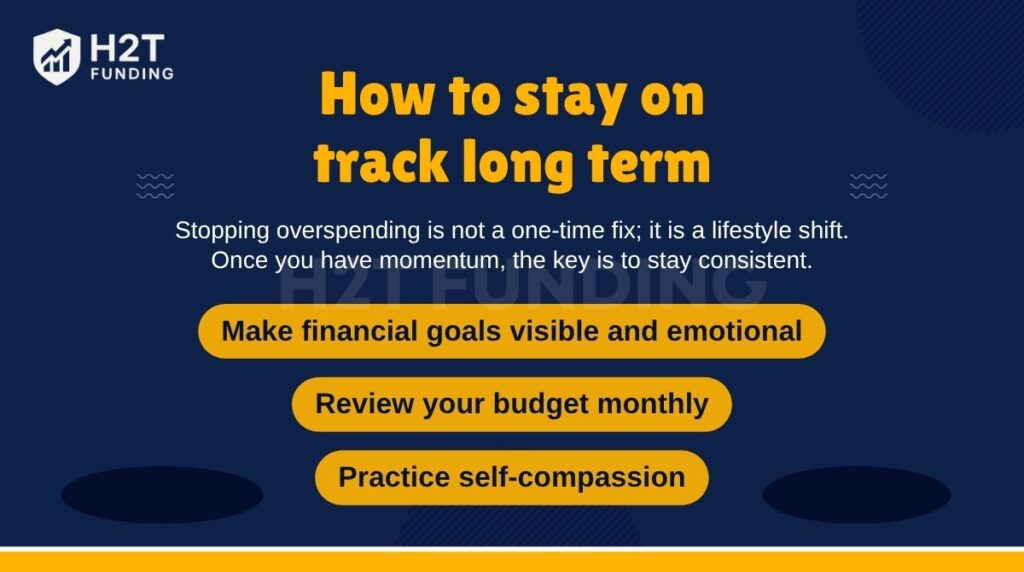Overspending is a common financial struggle, especially in a world designed to tempt you at every turn.
Whether it’s impulse shopping, ordering takeout often, or buying things to feel better, it’s important to learn how to stop overspending. That’s key to building a healthy financial future.
In this guide, I will share the root causes of overspending and provide practical, realistic steps to help you break the cycle and take back control.
Key takeaways
- Overspending often stems from emotional triggers rather than poor budgeting, so awareness is the first step toward gaining control.
- Building mindful habits like realistic budgeting, delaying purchases, and tracking expenses helps you spend with purpose.
- Using budgeting apps such as YNAB, EveryDollar, or PocketGuard makes it easier to monitor expenses and avoid overspending.
- Reducing exposure to ads and social media while finding healthier ways to handle stress prevents emotional spending.
- Regular budget check-ins and self-compassion help you stay disciplined and learn how not to overspend.
1. How to stop overspending and why we overspend
According to a NerdWallet survey, 83% of Americans say they sometimes spend more than they should. Among those with a monthly budget, 84% admit they’ve gone over it. Food alone is a major trigger; nearly half (47%) overspend on groceries, and 34% on dining out. Those extra charges often end up on credit cards, which makes the financial cycle even harder to break.
Learning how to stop overspending money starts with recognizing the behavior itself and understanding that most of us struggle with it more often than we admit.
I used to think I had full control over my finances. But every time I felt stressed or tired, I’d scroll through shopping apps and buy things I didn’t need, a classic case of emotional spending and impulse purchases. It gave me a quick sense of comfort, but the regret always followed. That’s when I realized overspending was less about money and more about emotion.
To stop overspending and take control of my financial wellness, I had to shift my mindset about money. Setting a realistic budget, giving myself time to think before buying, and staying away from online shopping triggers were game-changers.

Before we fix the habit, we need to understand why it happens. Overspending isn’t just poor math; it’s often tied to deeper emotional and psychological patterns.
Here are the most common psychological reasons for overspending:
- Emotional spending: Buying to cope with stress, sadness, boredom, or low self-esteem.
- Social pressure: Trying to keep up with friends, family, or influencers.
- Fear of missing out (FOMO): Buying because you fear a deal or opportunity won’t come again.
- Targeted marketing: Personalized ads and “limited-time offers” that make you feel like you need to act now.
- Lack of financial awareness: Not tracking your spending patterns or budgeting properly, leading to unconscious overuse.
Once you recognize these triggers, you can start applying actionable strategies to avoid overspending, control your budget, and save money for the future, which we’ll explore in the next section.
If your income fluctuates, check out this guide on budgeting for irregular income to help you stay consistent.
2. 12 actions you can take to stop overspending
If you’re wondering how to prevent overspending or finally take control of your finances, the key is building small, repeatable habits that protect your financial wellness.
In this section, I’ll share 12 actionable strategies that helped me shift from emotional, impulse purchases to mindful, intentional spending. Those are real steps that show how to overcome overspending and build lasting control.
Here’s a quick look at what you’ll learn in this section:
- How to create a realistic budget
- Simple tricks to delay purchases
- A no-spend challenge that reshapes your mindset
- How to use cash or debit to control daily expenses
- The power of shopping with a list
- Ways to unsubscribe from marketing emails
- How to limit exposure to social media and ads
- Smart tips to plan meals and cut food delivery costs
- Healthy alternatives to retail therapy
- How to get support from friends or online communities
- The best budgeting apps to track your money easily
- Why leaving credit cards at home can reduce overspending
I’ve personally tried each of these, and while progress didn’t happen overnight, these strategies truly helped me regain control and spend with purpose.

Let’s dive into these 12 proven ways to stop overspending and start saving more intentionally today.
2.1. Create a realistic budget
The first step in learning how to control overspending is understanding where your money actually goes. Start by tracking your expenses and income for one month, then categorize your spending into three main areas:
- Essentials: Rent, utilities, and groceries
- Savings: Emergency fund, investments
- Discretionary: Dining out, entertainment, hobbies
Use budgeting apps like YNAB, Goodbudget, or EveryDollar to stay organized and automate tracking.
Example: Let’s say you earn $3,000 a month. You spend:
- $1,500 on essentials
- $500 goes into savings
- That leaves $1,000 for discretionary spending
Now you can decide how to divide that $1,000. Maybe $200 for eating out, $100 for entertainment, and the rest as flexible fun money.
Tip: Don’t cut everything at once. I once tried removing all takeout from my budget and gave up in two weeks. Now I budget $60/month for it guilt-free, and the rest stays on track.
If your income is inconsistent, this guide on how to budget on a low income will help you stay balanced even with irregular cash flow.
2.2. Use the 24-hour or 30-day rule before buying
Delay purchases to avoid emotional decisions.
Here is how to do it:
- For small items (something non-essential), wait 24 hours before buying.
- For bigger items (over $100), put them on a 30-day “cooling list.”
If you still want it after that time, then consider it.
This tip helps combat impulsive buying and helps you reflect on whether the item adds real value to your life.
Real example:
I wanted to buy a $120 Bluetooth speaker. So I put them on a 30-day “cooling list”. After a 30-day wait, I realized I only used my old one once a month, so I skipped the purchase. And I saved $120.
2.3. Try a no-spend challenge
It’s a short-term challenge where you only spend on necessities.
How to do it:
- Set a timeframe (week, month, or even just weekends).
- Define what’s allowed (groceries, gas) and what’s off-limits (clothes, dining out).
Benefits: You’ll start seeing how often you spend out of boredom or emotional triggers, a core cause of emotional spending.
Make it fun: Do it with a friend or turn it into a mini game. It’s a great way to boost your financial wellness while saving money fast.
It’s one of the simplest ways to improve your finances, save quickly, and learn how to stop overspending and save money in daily life.
You can read more budget challenge ideas in this article: Budgeting Challenge Ideas
2.4. Use only cash or debit for discretionary spending
Credit cards make spending feel painless. That’s part of the problem. Try using only cash or debit for things like groceries, clothes, or entertainment.
Why it helps: You feel the transaction. When you see your wallet thinning or your bank balance dropping, you naturally become more cautious.
Pro tip: Use the envelope system label envelopes for each spending category (e.g., dining out, fun, personal care) and use only what’s inside.
My method: $100/week in cash was my fun money. I quickly learned what was worth it and what wasn’t.
2.5. Shop with a list
Unplanned shopping is one of the easiest ways to blow your budget. If you’re wondering how to avoid overspending while shopping, the answer is simple: plan and shop with intention.
- Before any store trip, write down exactly what you need.
- Stick to the list, no impulse items, no “maybe” purchases.
- If something catches your eye, add it to a “think later” list for next time.
What changed: My grocery bills dropped by $40 a week once I committed to using lists, and nothing else.
According to the USDA, grocery bills can vary up to 25% based on list-making alone. You can also try a save money on groceries app like Ibotta or Flipp to track deals and cashback offers while shopping.
2.6. Unsubscribe from promotional emails
Marketers are good at creating false urgency. If your inbox is full of discounts and “last chance” alerts, it’s harder to resist temptation.
- Use tools like Unroll. Me or Gmail filters to mass unsubscribe.
- Unfollow or mute brands on social media that make you want to spend.
- Delete saved credit cards on shopping apps to slow yourself down.
After cleanup: No more “surprise” orders because of flash sales. My inbox is quieter, and so is my spending.
Bonus tip: Turn off push notifications from shopping apps.
2.7. Limit exposure to shopping triggers (social media, ads)
If you’re trying to stop smoking, you don’t hang out at a cigar bar. Same idea here.
Your environment influences your spending. Limit exposure by:
- Use browser extensions to block shopping ads and pop-up banners.
- Set daily screen limits on apps like Instagram or TikTok.
- Mute influencers or hashtags that push new products constantly.
Instead, follow creators or accounts focused on minimalism, financial freedom, or budgeting.
2.8. Plan meals and reduce food delivery costs
Food delivery is convenient, but it’s often a financial black hole, one of the fastest ways to lose track of your spending. Learning how to stop spending money on food starts with building a simple routine of meal planning to save money and reduce daily temptations to order out.
Solution:
- Planning meals to save money.
- Cook in batches.
- Keep easy frozen meals for busy days.
Helpful tools: Mealime, Paprika, or Google Sheets.
If you prefer a structured saving approach, check out the pay yourself first method, which teaches you how to prioritize savings before spending.
2.9. Find non-shopping ways to relieve stress or boredom
A lot of overspending comes from trying to feel better. But there are cheaper ways to do that.
Alternatives to shopping:
- Go for a walk or a workout
- Call a friend
- Listen to music or a podcast
- Journal or meditate
- Do a home spa night
Start identifying your emotional triggers and redirecting them.
My swap: Instead of late-night online shopping, I now journal or stretch. It resets my mind and saves my bank account.
2.10. Get support from a friend or online group
Telling someone about your goals makes you more likely to stick to them.
Try:
- Finding a money buddy to check in weekly.
- Posting progress in a Reddit group like r/PersonalFinance or r/Frugal. You can also find real-life experiences and advice from people in similar situations by searching the keyword How to stop overspending Reddit.
- Keeping a spending journal to track your emotions and purchases.
My habit: Every Friday, I text a friend one money win and one lesson learned. It keeps both of us on track.
2.11. Use budgeting/tracking apps
Apps make budgeting less painful and more insightful.
Top apps:
- YNAB (You Need A Budget): Best for proactive budgeting
- PocketGuard: Shows what you can safely spend
According to NerdWallet, users who track spending digitally are 22% more likely to stay on budget.
2.12. Leave credit cards at home
Sometimes, simplicity wins.
Leave your credit cards in a drawer or freeze them (literally, in ice). Make it inconvenient to use them.
You’ll start thinking twice before making purchases.
Bonus tip: Remove saved cards from your browser or phone to create more friction during checkout.
View more:
3. How to stay on track long term
Stopping overspending is not a one-time fix; it is a lifestyle shift. Once you have momentum, the key is to stay consistent. Here are some strategies to help you build long-lasting financial habits.

3.1. Make financial goals visible and emotional
It’s so easy to lose focus if your goals are vague, isn’t it? Just saying “save money” isn’t going to cut it.
Instead, write them down. But don’t just write them; connect them to something that truly moves you. Make them emotional. Think about why you want to achieve this goal and how it will make you feel.
For example: “Save $5,000 for a trip to Japan with my sister before she gets married.” Can you imagine the memories you’ll make? The delicious food, the stunning temples, the priceless bonding time. That’s the feeling you’re saving for.
Once you’ve made your goals clear and emotional, place them somewhere you’ll see daily. Put them on your mirror, set them as your phone background, or stick them on your fridge. That constant visual reminder really does work.
I used to have a picture of the Japanese temple I wanted to visit as my phone wallpaper, and it constantly reminded me of my savings goal. Every time I unlocked my phone, it was a little nudge to stay focused.
3.2. Review your budget monthly
Life throws curveballs, right? A budget that worked perfectly in January might not work at all by June. That’s why setting a calendar reminder to review your budget once a month is crucial.
During this monthly review, take a moment to adjust for any new expenses, income changes, or shifting priorities. This simple habit helps prevent financial drift and ensures your money stays aligned with your life and your goals.
Last year, my commuting costs suddenly doubled when my car broke down. My monthly budget review helped me identify this new expense and adjust other spending categories to compensate, preventing a complete derailment.
3.3. Practice self-compassion
You will mess up sometimes. We all do. What matters is not perfection; it is persistence.
Instead of saying, “I completely failed,” try reframing it with kindness. Tell yourself, “That was just a detour. A temporary bump in the road. Now, let’s get right back on track.”
Guilt does not help. It only paralyzes you and drains your motivation. Learning does. Take a deep breath, understand what happened without judgment, forgive yourself, and then, powerfully, bravely, move forward.
4. FAQs
The first step is awareness. Track every expense for one month using a notebook, spreadsheet, or budgeting app. Write down even the small things, coffee, snacks, or parking fees. Once you know where your money goes, you can make conscious choices and start improving control.
Treat it like any addiction: identify triggers, limit exposure, and seek support. For some people, especially those who struggle with focus or impulsivity, exploring resources related to how to stop spending money on ADHD can be very helpful. These often include structured routines, accountability tools, and mindfulness techniques that reduce impulse-driven purchases.
Yes. Reputable apps like YNAB, PocketGuard, or EveryDollar use bank-grade encryption and do not store your login information. They connect securely through your bank’s API and prioritize privacy. Always check user reviews and privacy policies before syncing accounts, and use two-factor authentication for extra protection.
Absolutely, and you should. A good budget isn’t about restriction; it’s about balance. Set aside a small “fun spending” category each month so you can enjoy things guilt-free while staying disciplined overall. Allowing yourself small rewards makes budgeting sustainable and prevents burnout or binge spending later.
There’s no fixed number, but many people see progress within 30 to 90 days of consistent effort. The key is repetition; each time you pause before a purchase, you’re rewiring your habits. Over time, those small decisions compound, and what once felt difficult becomes automatic. Tracking wins along the way helps you stay motivated and recognize growth.
You may overspend because of emotional spending, impulse buying, or a lack of budgeting. Many people who feel like “I can’t stop spending money” are reacting to stress or boredom rather than real needs. Recognizing those triggers is the first step to gaining control.
Yes, for many people, $50 a week can be enough for groceries if you plan meals carefully and avoid processed or ready-made foods. Focus on essentials like rice, pasta, eggs, vegetables, and frozen proteins. Using store-brand items and meal planning to save money will stretch your budget further.
The 6-to-1 grocery method is a simple meal-planning strategy where you plan six home-cooked meals and allow one for takeout or leftovers. It helps reduce decision fatigue, food waste, and unnecessary spending. This approach is especially useful when learning how to stop spending money on food or trying to lower your weekly grocery bill.
A good rule of thumb is to spend 10–15% of your monthly income on groceries. For example, if you earn $3,000 a month, aim for $300–$450. Adjust based on your location, dietary needs, and lifestyle. Tracking your food expenses for a few weeks will help you understand your real spending patterns and fine-tune your grocery budget.
Start by identifying your triggers, emotional spending, boredom, or social pressure, and limit exposure to them. Use budgeting apps or the 24-hour rule before any non-essential purchase. Small, mindful choices each day are the key to stopping overspending for good.
The 70/20/10 rule divides your income into three simple parts: 70% for living expenses, 20% for savings or debt repayment, and 10% for giving or investing. It’s an easy budgeting guideline for beginners and can work alongside the pay yourself first method to help you save automatically and stay on track financially.
Discipline starts with structure. Set clear financial goals, give yourself a weekly allowance, and track every purchase. Delete saved cards from shopping apps, unsubscribe from marketing emails, and use cash for discretionary spending. These habits make it easier to discipline yourself to not spend money impulsively and stay consistent with your goals.
To control daily spending, set small spending limits for different categories like coffee, lunch, or transport. Use mobile banking apps to monitor transactions in real time and review your expenses every evening. Awareness builds discipline, and over time, these daily habits help you naturally reduce overspending and maintain better financial wellness.
5. Conclusion
Learning how to stop overspending starts with consistent choices that reflect what truly matters to you. You do not need to be perfect. You just need to be intentional.
When I realized my spending habits were getting out of hand, I challenged myself to a no-spend weekend. Just two days without shopping helped me become more aware of my impulses and saved more than I expected. That simple strategy gave me the momentum to stick to better habits long-term.
If you need a place to start, try a no-spend weekend. It is small, manageable, and incredibly eye-opening.
Explore more practical tips in our Cash Flow & Saving Strategies section at H2T Funding.





